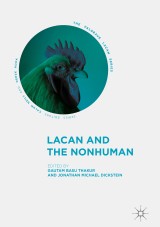Details

Lacan and the Nonhuman
The Palgrave Lacan Series
|
117,69 € |
|
| Verlag: | Palgrave Macmillan |
| Format: | |
| Veröffentl.: | 22.01.2018 |
| ISBN/EAN: | 9783319638171 |
| Sprache: | englisch |
Dieses eBook enthält ein Wasserzeichen.
Beschreibungen
<p>This book initiates the discussion between psychoanalysis and recent humanist and social scientific interest in a fundamental contemporary topic – the nonhuman. The authors question where we situate the subject (as distinct from the human) in current critical investigations of a nonanthropoentric universe. In doing so they unravel a less-than-human theory of the subject; explore implications of Lacanian teachings in relation to the environment, freedom, and biopolitics; and investigate the subjective enjoyments of and anxieties over nonhumans in literature, film, and digital media. This innovative volume fills a valuable gap in the literature, extending investigations into an important and topical strand of the social sciences for both analytic and pedagogical purposes.<br></p>
<p>PART I: DEFINITIONS AND CONTEXTS.- Chapter 1: “Bestiarum Vocabulum Lacaniensis: A Concise Outline of Psychoanalytic Zoology” by Dany Nobus (Brunel University London).- Chapter 2: “Man is not Entirely in Man” by Kiarina Kordela (Macalester University).- Chapter 3: “Freud, Lacan, and the Human Nonhumanity of Coitus Interruptus” by Jamieson Webster (Eugene Lang College and New York University).- Chapter 4: “‘<i>L’extermination de tout symbolisme des cieux</i>’: Reading the Lacanian Letter as Inhuman ‘Apparatus’ and its Implications for Ecological Thinking” by Kevin Andrew Spicer (University of St. Francis).- Chapter 5: “Affective Posthumanism” by Marie-Louise Angerer (University of Potsdam).- Chapter 6: “The Undead: Lacan and Vico, the Critical Link” by Donald Kunze (Penn State University).- Chapter 7: “The Sovereign Signifier: Agamben and the Nonhuman” by Paul Eisenstein (Otterbein University).- Chapter 8: “Lacan and the Mechanism of Full Speech” by Ed Pluth (California State University, Chino).- PART 2: APPLICATIONS.- Chapter 9: “Like an Animal: A Simile Instead of a Subject” by Todd McGowan (University of Vermont).- Chapter 10: “A horse—no worse? Phobia and the failure of human metaphors in psychoanalysis” by Celeste Pietrusza and Jess Dunn (Duquesne University).- Chapter 11: “Beckett’s ‘Marionette Theater’: Psychoanalysis, Ontological Violence and The Language of Desubjectification in <i>Malloy and Malone Dies</i>” by Amanda Duncan (Pacific University).- Chapter 12: “Do Electric Sheep Dream of Androids?” by Calum Neill (Edinburgh Napier University).- Chapter 13: “ASMR Mania, Trigger Politics, and the Anxiety of Digital Repletion” by Hugh Manon (Clark University).- Chapter 14: “For the Love of Nonhumanity: Transference and the Anxiety of Algorithmic Critique” by Jonathan Michael Dickstein (Independent Scholar).</p>
<p>Gautam Basu Thakur is Associate Professor of English at Boise State University, USA where he teaches courses in critical theory, postcoloniality and globalization, and British Empire studies. His first book, <i>Postcolonial Theory and Avatar</i>, was published in 2015.</p><p>Jonathan Michael Dickstein is an independent scholar. He teaches literature and media studies and researches connections between psychoanalysis, mathematics, and narrative theory.</p><div><br></div>
This book initiates the discussion between psychoanalysis and recent humanist and social scientific interest in a fundamental contemporary topic – the nonhuman. The authors question where we situate the subject (as distinct from the human) in current critical investigations of a nonanthropoentric universe. In doing so they unravel a less-than-human theory of the subject; explore implications of Lacanian teachings in relation to the environment, freedom, and biopolitics; and investigate the subjective enjoyments of and anxieties over nonhumans in literature, film, and digital media. This innovative volume fills a valuable gap in the literature, extending investigations into an important and topical strand of the social sciences for both analytic and pedagogical purposes.
Responds to new speculations in the humanities including environmentalism, global and transnational studies, animal and animality studies and post- and trans- humanism(s) Inaugurates a constructive dialogue between critical treatments of Freudian-Lacanian theory and those of the concept of the nonhuman Engages in active interpretations of the terms human and nonhuman
“The idea of theoretical antihumanism and of an inhuman subject played an important role in contemporary French thought, from Lacan to Badiou. Lately, cognitive sciences proposed another version of antiumanism: the idea that we are entering a posthuman era. In this way, posthumanism is no longer a theoretical proposal but a matter of our daily lives. Can these two aspects be brought together? Lacan and the Nonhuman deals with this topic, and this is why it is an epoch-making book whose potentials are explosive - both sides lose their innocence. Nothing will be the same after this book.” (Slavoj Žižek) <p>“One could argue that Lacan has from the beginning of his teaching gestured to the “nonhuman” with his conception of language as structure, that language, as Maire Jaanus explains, “has nothing ‘human’ about it. Signifiers are dead.” In this strikingly original and provocative collection of essays by established and new scholars, the current “nonhuman turn” in the humanities is explored through a Lacanian orientation. The collection rewards both new readers of Lacan as well as experienced readers of Lacan and importantly engages some of Lacan’s later seminars which have been woefully under-engaged in the U.S. for too many years. Readers will be startled by the new angles of vision that Lacan’s early and later work opens up in the “non-anthropocentric humanities.” (Antonio Viego, Duke University, USA and author of Dead Subjects: Toward a Politics of Loss in Latino Studies)</p> <p>“Lacan and the Nonhuman is a truly forceful, delightfully inspiring collection of essays. It does not simply add Lacan to the corpus of nonhuman studies, but gives to the notion of nonhuman a whole new twist, as well as a most engaging and productive philosophical edge.” (Alenka Zupančič, Professor of Philosophy and Psychoanalysis at The European Graduate School)</p>

















